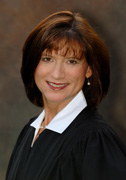 I had the opportunity last week to attend Women Judges’ Night, an event that the Association for Women Lawyers presents annually (indeed, this year’s dinner was the thirtieth such). The Hon. Diane S. Sykes, L’84, of the United States Court of Appeals for the Seventh Circuit, delivered what was billed as a keynote but was also in the nature of after-dinner remarks. The speech was a very good example of either form, for reasons related to its warmth, its willingness to take on a substantive and even somewhat contentious topic, and the speaker’s self-awareness and humor.
I had the opportunity last week to attend Women Judges’ Night, an event that the Association for Women Lawyers presents annually (indeed, this year’s dinner was the thirtieth such). The Hon. Diane S. Sykes, L’84, of the United States Court of Appeals for the Seventh Circuit, delivered what was billed as a keynote but was also in the nature of after-dinner remarks. The speech was a very good example of either form, for reasons related to its warmth, its willingness to take on a substantive and even somewhat contentious topic, and the speaker’s self-awareness and humor.
Judge Sykes began with a “confess[ion]”:
[T]the idea of a “Women Judges Night” has always made me vaguely uneasy. I’m uncomfortable with the implications and consequences of gender-identity politics—or any identity politics, for that matter. When we celebrate Women Judges Night every year, what is it precisely that we’re celebrating? If we’re celebrating the appointment or election of women judges just because they are women, then I think we are making a mistake about the qualities necessary in a good judge, which of course are not gender-specific. If we’re celebrating the appointment and election of women judges because they subscribe to a gender-based brand of judging, then we are making an even bigger mistake about the nature of the judicial role. I don’t think we’re celebrating either of these things, but I do think it’s important for us to be careful not to diminish the contributions of women judges by emphasizing their gender as if it had something to do with their qualifications for judicial office or has substantive significance in their work.
She would conclude with her own assessment of what the event celebrates, along the way touching upon matters from Madison to Washington, D.C.—from her former court, a majority of whose justices were in attendance (viz., Chief Justice Shirley S. Abrahamson, Justice Ann Walsh Bradley, Justice Annette K. Ziegler, and Justice Patience D. Roggensack, the last of whom introduced Judge Sykes), to the United States Supreme Court and, in particular, last year’s confirmation of Justice Sonia Sotomayor.
In the former regard, Judge Sykes discussed at some length State v. Oakley, 2001 WI 103, 245 Wis. 2d 447, 629 N.W.2d 200, a case in which, in Judge Sykes’s words, “the court concluded that [a] no-procreation probation condition was constitutional” in the case of a “deadbeat dad who was hopelessly and criminally in arrears on his child support.” The case attracted national attention, especially because the three women on the court—Chief Justice Abrahamson, Justice Bradley, and Justice Sykes—dissented, while the four male justices comprised the majority. Judge Sykes maintained that the case “had no gender-salient issues (assuming there is such a thing).”
Judge Sykes then segued to a discussion of comments by now-Justice Sonia Sotomayor, during her tenure on the United States Court of Appeals for the Second Circuit: “[In] words that were to go viral during the [Supreme Court] confirmation process[,] she said: ‘I would hope that a wise Latina woman with the richness of her experiences would more often than not reach a better conclusion than a white male who hasn’t lived that life.’” Judge Sykes discussed as well Justice Sotomayor’s “retrea[t] from this view during her confirmation hearings.”
Judge Sykes would go on to give her take on the role of empathy in judging and “the question of gender and judging.” Her prepared text can be found here and is well worth reading in its entirety—both for its content, well beyond what I have excerpted here, and its form.
Finally, kudos to my faculty colleague, Professor Jessica E. Slavin, for her work in putting this year’s Women Judges’ Night together.
